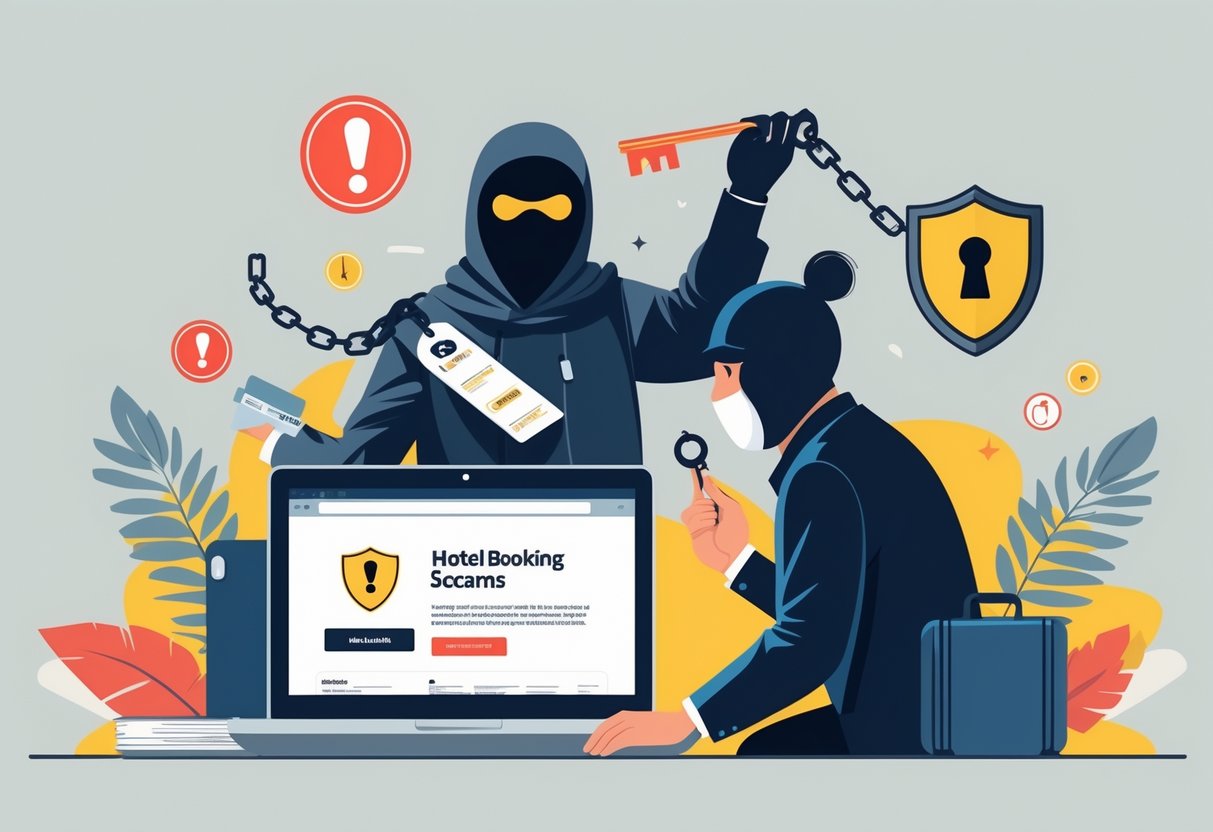
How Scammers Use Fees to Trick Travelers
Scammers exploit hidden and inflated fees to make illegitimate hotel bookings look more appealing. Fraudulent booking sites may display an initially low rate but add significant extra costs during checkout or upon arrival, creating confusion and financial loss.
These fake hotel sites often mimic official brands with professional-looking layouts and logos.
Common scam tactics include:
- Charging “resort fees” that don’t exist at the real property.
- Adding duplicate or fake service charges to inflate the total.
- Using unclear small print to hide the true price until payment.
- Claiming certain fees are government-mandated when they are not.
Travelers should cross-check bookings on the official hotel website, read reviews, and confirm the breakdown of all charges. Double-checking before finalizing payment helps avoid falling for these deceptive practices and protects against travel fraud.
Role of Travel Agents and Businesses

Selecting safe hotel bookings often depends on the reliability of travel agents and the vigilant practices of businesses in the travel sector. Identifying trustworthy professionals and robust security protocols can significantly reduce the risk of falling victim to fraudulent bookings.
Working with Reputable Travel Agents
A reputable travel agent acts as a crucial line of defense against hotel booking scams. To help confirm an agent’s legitimacy, travelers should check for membership in recognized industry organizations, such as the American Society of Travel Advisors (ASTA) or International Air Transport Association (IATA).
Professional travel agents offer secure payment options, transparent refund policies, and are able to provide full documentation of booking details. Clients benefit from their established relationships with hotels and can verify bookings independently with the accommodation before paying.
Warning signs of fraudulent travel agents include:
- Lack of verifiable business address or contact information
- High-pressure sales tactics demanding immediate payment
- Refusal to provide written terms or cancellation policies
Conducting research through online reviews and reputable sources helps travelers confirm the agent’s track record. Direct communication with actual hotels can also reveal potential discrepancies in reservation details.
Business Best Practices
Travel businesses—including agencies and hotels—play a key role in protecting consumers from scams. Adopting strict verification methods, such as multi-factor authentication for customer accounts and confirming client identities, reduces the risk of fraudulent activity.
Implementing staff training on fraud detection is vital. Employees should be aware of common scam patterns like fake payment requests and account takeovers.
Businesses should display clear policies on cancellations and refunds, as highlighted in industry guidelines, and provide this information before collecting payments.
Best practices for businesses include:
- Using secure payment gateways
- Monitoring transactions for suspicious activity
- Responding quickly to customer inquiries about authenticity
By maintaining transparency and prioritizing up-to-date cybersecurity protocols, travel companies support customer trust and minimize vulnerabilities to scams.
How to Respond If You Suspect a Scam
Taking action as soon as you suspect a hotel booking scam can limit financial losses. Accurate reporting and proper notification are key to recovering your funds and preventing future fraud.
Reporting Scams
When travelers believe they have encountered a hotel booking scam, it is critical to gather and document as much information as possible. Save all emails, receipts, website links, and screenshots of communications with the suspected scammer.
Preserve copies of any phishing emails or suspicious payment confirmations. File a report with the Federal Trade Commission (FTC) at ReportFraud.ftc.gov.
The FTC collects scam reports and uses them to investigate patterns and support law enforcement. Many banks and credit card companies also have fraud departments that can help with disputed or unauthorized transactions.
If payment was made by credit card, contact the card issuer to start a chargeback process. Banks often have protocols for suspected fraud and may be able to reverse transactions in certain cases.
For scammers impersonating real businesses, contact the legitimate hotel or travel provider to alert them and ask for guidance on how to proceed.
Notifying Authorities
Official notification is important for stopping scammers and seeking justice. Contact local police to file a formal report, especially if a substantial amount of money has been lost or if identity theft has occurred.
Most law enforcement agencies have processes for documenting online fraud and may assist with further steps. Alerting authorities is also essential for establishing a paper trail if legal support is needed later.
Victims may also report fraudulent travel offers or phishing emails to the consumer protection office in their state or country. For added security, immediately update passwords and enable two-factor authentication on all affected accounts to prevent further unauthorized access.
Stay alert for follow-up phishing emails or calls from scammers posing as recovery agents or officials. Never provide confidential information to unknown parties, and use verified communication channels listed by the FTC or your financial institution to interact safely.



